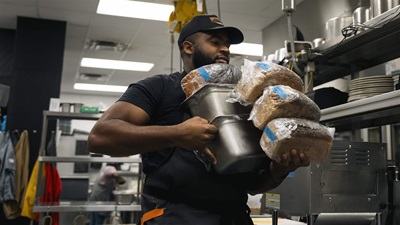Overview
Economic opportunity is the foundation of American society. Pew supports national, state, and local efforts to expand opportunity and promote financial well-being. Our work helps people pay off student loans, navigate court proceedings such as debt collection, buy or rent a home, access affordable internet, and save for their retirement.

Business ownership, like homeownership, is a major driver of economic mobility and wealth for many individuals and families, but it varies considerably by race, ethnicity, and sex. Federal data sheds new light on how, in recent years, business ownership has risen sharply throughout the country but at uneven rates for Black, Hispanic, Asian, White, female, and male entrepreneurs in different cities and counties, reflecting varying local economic environments.

Nearly 57 million American workers—almost half of the private sector workforce—don’t receive retirement benefits at their workplaces. That lack of access affects their ability to save and plan for their financial future, including retirement.

In Philadelphia, the number of residents 65 and older has been growing in recent years, increasing by 22% since 2013, to 235,772 individuals in 2023. And this population will continue to expand—the U.S. Census Bureau estimates that 1 in 5 U.S. residents will be 65 or older by 2030; and by 2034, older residents will outnumber those under age 18.

Homeownership is the most common way that Americans build wealth, and mortgages are the safest and most cost-effective way of financing a home purchase. But high mortgage rates and stringent credit standards lead some aspiring homebuyers to seek other financing options, which come with greater financial risks and fewer legal protections than mortgages offer.

Retirement security depends on individuals saving for their future, but millions of Americans lack access to an employer-provided savings plan that might help them do so. Research shows that workers are 15 times more likely to save for retirement if they can set aside money through payroll deductions. But many small businesses cannot offer retirement benefits because of high startup costs and a lack of administrative capacity.
Our Work

Good health is important to everyone. Pew conducts research and provides information and fact-based recommendations to state agencies, hospitals, researchers, and other health partners to help them provide better care. We find and share evidence-based practices to improve Americans’ health and well-being, including services that can prevent suicide, improve mental health care, and treat substance use disorder.
Latest In Advance Health & Well-Being

Communities throughout the country share common needs: affordable connections to broadband Internet, modern and reliable energy infrastructure, effective responses to mental health challenges, and ways to resolve legal disputes more quickly and fairly. To address these issues, Pew collaborates with states and local governments to find and promote evidence-based solutions that help provide stability and opportunity.
Latest In Build Communities

Nonpartisan, fact-based improvements in federal policy can create jobs, lower costs, and help the nation prepare for the future. When our research shows that small changes can have a big impact, we work across party lines to improve national challenges like housing affordability, internet access, energy reliability, and health care.
Latest In Improve Federal Policy
/16x9_m.jpg?mw=352&hash=5394D3C3222DC77A0FAB569584F50D98)
Economic opportunity is the foundation of American society. Pew supports national, state, and local efforts to expand opportunity and promote financial well-being. Our work helps people pay off student loans, navigate court proceedings such as debt collection, buy or rent a home, access affordable internet, and save for their retirement.
Latest In Improve Economic Advancement

The global ocean teems with life, and it contributes to the vital cycles that keep people and our planet healthy. But the seas are vulnerable to overfishing, loss of habitat such as seagrasses and mangroves, ineffective fisheries management, plastic pollution, and declining biodiversity. These mounting losses affect the coastal communities that depend on the ocean for food and jobs.
Latest In Protect Marine Life

States and cities are the “laboratories of democracy” in America—the places where lawmakers and governors look for new ways to help their communities succeed. Whether in Pew’s hometown of Philadelphia or any of the 50 state capitals, we help elected leaders respond to the needs of their citizens, use public dollars wisely, fix outdated policies, and build a better future for all.
Latest In Strengthen State Government

Conserving natural spaces conveys benefits far beyond the gains to wildlife and their habitats. As scores of studies show, protecting and restoring lands and waters, particularly when done in close partnership with local communities, also improves people’s lives—and local economies—by increasing tourism and outdoor recreation.
